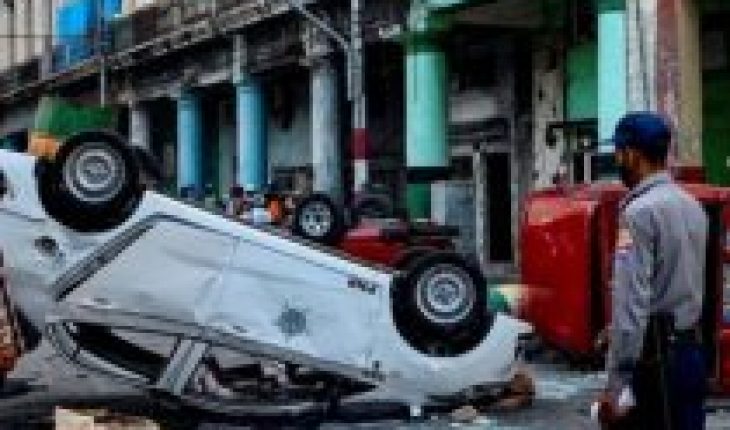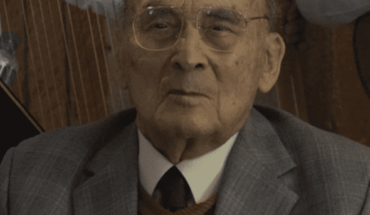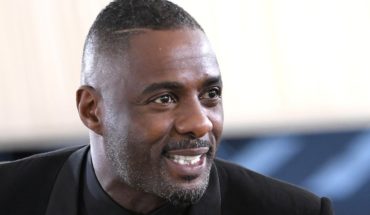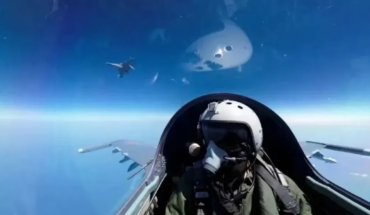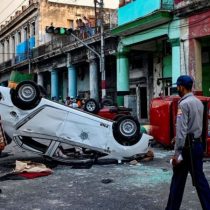
The unusual protests that erupted in Cuba on Sunday have sparked a cross-over of harsh recriminations between that country’s government and the United States.
Cuban President Miguel Diaz-Canel accused Washington on Monday of pushing “a policy of economic suffocation to provoke social upheavals” in his country.
The UNITED STATES has been applying a trade embargo on Cuba for decades, which was condemned in June for the 29th time by a large majority of the United Nations General Assembly.
“If you want to help Cuba, the first thing you should do is suspend the blockade,” Mexican President Andres Manuel Lopez Obrador said Monday, referring to the protests on the island on Monday.
In the midst of an economic and health crisis due to the coronavirus pandemic, Cuba lived sus largest manifestations in decades against the communist government, which according to human rights groups, violently repressed them. Diaz-Canel on Sunday announced a “combat order” for his forces to respond to protests in the streets and on Monday said there were “criminals” in the demonstrations.
U.S. President Joe Biden in a statement supported the “cry for freedom” in Cuba and called on the Government of Havana “to listen to its people and attend to their needs at this vital moment instead of getting rich.”
While he promised a new policy toward Cuba, Biden has so far maintained restrictions on travel and remittances to the island imposed by his predecessor Donald Trump, who reversed the Barack Obama administration’s approach to Havana that Biden oversaw as vice president.
The White House on Monday responded to criticism of the embargo, saying through its spokeswoman Jen Psaki that the move allows “humanitarian goods,” medical supplies and food to reach Cuba.
He also indicated that the fact that Cuba is maintained outside the Covax system for the international distribution of vaccines against covid-19 and has decided to use its own vaccine is one of the challenges for shipping doses to the country.
But the White House could do “much more” without lifting the embargo, says Andy Gomez, a retired director of the Institute for Cuban and Cuban-American Studies at the University of Miami.
The following is a summary of the dialogue he had with BBC Mundo:
Were you surprised by Sunday’s protests in Cuba?
Yes and no. I was surprised by the number of people across the island, because that has not been seen since the beginning of the Cuban revolution.
The frustration has reached a point that is so great, first, because of the economy that is on the floor: not even with money can you compare food.
An undetermined number of people were arrested during Sunday’s demonstrations in Cuba. IMAGE SOURCE: GETTY IMAGES
Second, the pandemic. Cuba has said it has vaccines, but the pandemic over the past two weeks continues to grow day by day.
And third, Trump’s policy that took financial aid from cuban exile off family and friends in Cuba has had a very negative impact on the island.
What we saw yesterday (for Sunday) was a level of frustration from the Cuban people that hasn’t been seen in nearly 63 years.
Are the protests going to continue?
Very good question. Although I remain very optimistic that they will be able to, the level of repression by the Cuban government is very powerful.
I don’t think what we Cubans saw can sustain and sustain, for example, as we saw in Venezuela for weeks and months.
The Cuban government cut off the media, the internet, so it’s been hard to get messages and views of what’s going on on the island.
It is being reported that the repression has been so great that many people have been caught, taken to jail, beaten…
President Díaz-Canel has attributed the worsening crisis in his country to the US trade embargo. Do you believe in this regard that Washington also contributed to the unleashing of these protests?
There is no doubt that the US economic embargo on Cuba has had a negative impact.
But centralized economic systems do not work. The problem in Cuba is not the US; the problem in Cuba is the Cuban government.
It is very easy to continue blaming the UNITED STATES, but the problem with Miguel Diaz-Canel and Bruno Rodíguez, the foreign minister, is that the Cuban people no longer believe that: they know that most of the problems are internal.
Miguel Diaz-Canel: The Cuban president maintained that the protests seek to “fracture the unity of the people.” IMAGE SOURCE: GETTY IMAGES
The United States is not going to lift the embargo without Cuba giving in or coming to the table to negotiate in good faith, least of all when human rights are not respected in Cuba.
Many of the embargo’s proponents have hoped for decades that the deteriorating situation in Cuba would spark anti-government protests. Does what is happening now on the island allow you to say that this strategy of more than 60 years now does work?
I haven’t seen any economic embargo through all the years I’ve studied that has brought down a government. But the pressure that continues to be put on Cuba is the result we saw on Sunday.
Is this the time to lift the embargo? No.
But if I were an adviser to President Biden I would do much more than the White House said.
For example, I would say that because of humanitarian cases I am raising up and allowing exile remittances to the Cuban people and that the United States is prepared, as we have done in Latin America, to send vaccines to Cuba, which is not going to accept them.
Within the same leadership of Cuban power I have been told over the years on visits to Cuba that they missed a great opportunity to negotiate more with Obama when we opened relations with Cuba, because their greatest fear is to lose political control.
Now, I don’t think what he showed yesterday (for Sunday) Miguel Diaz-Canel was a leader in total control.
Do you say that because of your decision to send your forces to the streets?
His very words, the symbolism of how he spoke to the Cuban people, is not of a leader who is in complete control.
I imagine that even though he is retired (former Cuban President) Raul Castro already has his hand involved in the decisions that were made yesterday, that have been taken today and will be taken in the future. In the long term, as we saw in Venezuela for many months, if the Cuban military does not break with the leadership it is very difficult to topple the Cuban government. I’m talking about officers and hundreds of Cuban soldiers.
The ones we are seeing in the streets beating the Cuban people are the special troops of the Ministry of the Interior, police and civilians. The Revolutionary Armed Forces have never called themselves to repress the Cuban people.
The question we have to ask ourselves is: if that time comes, will the military be in complete agreement to repress the Cuban people?
At the moment do you see no signs of separation between the civilian government and the armed forces?
no. As long as Raul Castro and other of the original commanders are alive, I don’t see the military corps breaking with the civilian government corps.
Remember that before becoming President Raul Castro was minister of the Armed Forces for 47 years and is highly respected by that military body.
Do you believe that there are conditions for the creation of a humanitarian corridor in Cuba?
I think so, without lifting the embargo, for humanitarian reasons.
The biggest problem that can be presented to this administration of President Biden, with all the problems that it already has, is that Cuba will again say that whoever does not want to be in Cuba, get out.
So we’re going to have a new crisis of rafters, which have already grown in numbers, at a time when this administration is dealing with a migration crisis on the U.S.-Mexico border.
What are we going to do with these Cubans on the high seas? Pick up? Trying to take them to Cuba? And if Cuba refuses, do we put them at the base in Guantanamo?
President Biden demanded that the Cuban government “listen to its people and attend to their needs at this vital time instead of getting rich.” Is it a change of strategy with respect to the Obama administration, which sought a rapprochement with Havana?
Obama tried to do it economically, knowing that if the government wasn’t going to be willing to open, it wasn’t going to happen. And it didn’t happen.
What President Biden is trying to do is that the policy is not between Havana and Washington, with Miami complicating the points, but that it is a multilateral policy on the issue of Cuba.
And that’s very difficult with all the problems that exist today internationally.
Many in Cuba, including within the government, hoped biden was going to return to Obama’s policy and I told them no.
He didn’t and kept Trump’s policies so far…
But in reality, with all the problems it had to face, Cuba was not on the list of priorities.
I am not saying that what happened in Cuba has returned to the list of priorities, but it has opened the eyes of the White House: the issue of Cuba must be dealt with immediately.
What seems clear is that Cuba is now one of the few issues that unite Democrats and Republicans in the US, both expressing support for the protesters. Does Biden have room in domestic politics to make a change in the sense of what you point out?
I always say that U.S. foreign policy on cuba is more domestic than international. Because florida’s vote is very important to elect the president, as we’ve seen.
In Florida we saw something that is still difficult to understand: many Cuban-Americans again supported President Trump, who put a very tough policy on Cuba.
Biden has waited to see what happens and how the case was studied. And the issue is still a little complicated.

